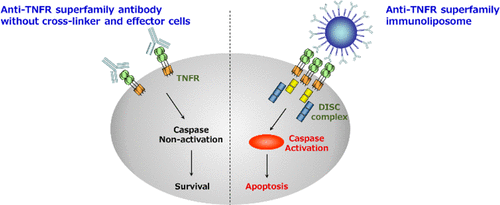当前位置:
X-MOL 学术
›
Mol. Pharmaceutics
›
论文详情
Our official English website, www.x-mol.net, welcomes your feedback! (Note: you will need to create a separate account there.)
Novel Immunoliposome Technology for Enhancing the Activity of the Agonistic Antibody against the Tumor Necrosis Factor Receptor Superfamily
Molecular Pharmaceutics ( IF 4.9 ) Pub Date : 2018-04-12 00:00:00 , DOI: 10.1021/acs.molpharmaceut.7b01167 Takako Niwa 1 , Yuji Kasuya 1 , Yukie Suzuki 1 , Kimihisa Ichikawa 1 , Hiroko Yoshida 1 , Akiko Kurimoto 1 , Kento Tanaka 1 , Koji Morita 1
Molecular Pharmaceutics ( IF 4.9 ) Pub Date : 2018-04-12 00:00:00 , DOI: 10.1021/acs.molpharmaceut.7b01167 Takako Niwa 1 , Yuji Kasuya 1 , Yukie Suzuki 1 , Kimihisa Ichikawa 1 , Hiroko Yoshida 1 , Akiko Kurimoto 1 , Kento Tanaka 1 , Koji Morita 1
Affiliation

|
We have developed a technology for efficiently enhancing the anticancer apoptosis-inducing activity of agonistic antibodies against the tumor necrosis factor receptor (TNFR) superfamily by the formation of immunoliposomes. To induce apoptosis in cancer cells, agonistic antibodies to the TNFR superfamily normally need cross-linking by internal immune effector cells via the Fc region after binding to receptors on the cell membrane. To develop apoptosis-inducing antibodies that do not require the support of cross-linking by immune cells, we prepared immunoliposomes conjugated with TRA-8, an agonistic antibody against death receptor 5 (DR5), with various densities of antibody on the liposome surface, and evaluated their activities. The TRA-8 immunoliposomes exhibited apoptosis-inducing activity against various DR5-positive human carcinoma cells at a significantly lower concentration without cross-linking than that of the original TRA-8 and its natural ligand (TRAIL). The activity of the immunoliposomes was correlated with the density of antibodies on the surface. As the antibody component, not only the full-length antibody but also the Fab′ fragment could be used, and the TRA-8 Fab′ immunoliposomes also showed exceedingly high activity compared with the parental antibody, namely, TRA-8. Moreover, cytotoxicity of the TRA-8 full-length or Fab′ immunoliposome against normal cells, such as human primary hepatocytes, was lower than that for TRAIL. Enhanced activity was also observed for immunoliposomes conjugated with other apoptosis-inducing antibodies against other receptors of the TNFR superfamily, such as death receptor 4 (DR4) and Fas. Thus, immunoliposomes are promising as a new modality that could exhibit significant activity at a low dose, for cost-effective application of an antibody fragment and with stable efficacy independent of the intratumoral environment of patients as a TNF superfamily agonistic therapy.
中文翻译:

新型免疫脂质体技术,可增强抗肿瘤坏死因子受体超家族激动剂的活性。
我们已经开发出一种通过形成免疫脂质体来有效增强针对肿瘤坏死因子受体(TNFR)超家族的激动性抗体的抗癌凋亡诱导活性的技术。为了诱导癌细胞中的细胞凋亡,通常在与细胞膜上的受体结合后,针对TNFR超家族的激动性抗体需要内部免疫效应细胞经由Fc区交联。为了开发不需要免疫细胞交联支持的诱导凋亡的抗体,我们制备了与TRA-8偶联的免疫脂质体,TRA-8是一种针对死亡受体5(DR5)的激动性抗体,脂质体表面具有各种密度的抗体,并评估了他们的活动。TRA-8免疫脂质体对各种DR5阳性人类癌细胞的诱导凋亡活性明显低于原始TRA-8及其天然配体(TRAIL),且没有交联。免疫脂质体的活性与表面上抗体的密度相关。作为抗体成分,不仅可以使用全长抗体,而且可以使用Fab'片段,并且TRA-8 Fab'免疫脂质体也比亲本抗体TRA-8表现出极高的活性。此外,TRA-8全长或Fab'免疫脂质体对正常细胞(例如人原代肝细胞)的细胞毒性低于TRAIL。对于与其他凋亡诱导抗体结合的针对TNFR超家族其他受体(例如死亡受体4(DR4)和Fas)的免疫脂质体,也观察到了增强的活性。因此,免疫脂质体有望作为一种新的形式在低剂量下表现出显着的活性,从而可以经济有效地应用抗体片段,并且具有稳定的功效,而不受患者肿瘤内环境的影响,作为TNF超家族激动疗法。
更新日期:2018-04-12
中文翻译:

新型免疫脂质体技术,可增强抗肿瘤坏死因子受体超家族激动剂的活性。
我们已经开发出一种通过形成免疫脂质体来有效增强针对肿瘤坏死因子受体(TNFR)超家族的激动性抗体的抗癌凋亡诱导活性的技术。为了诱导癌细胞中的细胞凋亡,通常在与细胞膜上的受体结合后,针对TNFR超家族的激动性抗体需要内部免疫效应细胞经由Fc区交联。为了开发不需要免疫细胞交联支持的诱导凋亡的抗体,我们制备了与TRA-8偶联的免疫脂质体,TRA-8是一种针对死亡受体5(DR5)的激动性抗体,脂质体表面具有各种密度的抗体,并评估了他们的活动。TRA-8免疫脂质体对各种DR5阳性人类癌细胞的诱导凋亡活性明显低于原始TRA-8及其天然配体(TRAIL),且没有交联。免疫脂质体的活性与表面上抗体的密度相关。作为抗体成分,不仅可以使用全长抗体,而且可以使用Fab'片段,并且TRA-8 Fab'免疫脂质体也比亲本抗体TRA-8表现出极高的活性。此外,TRA-8全长或Fab'免疫脂质体对正常细胞(例如人原代肝细胞)的细胞毒性低于TRAIL。对于与其他凋亡诱导抗体结合的针对TNFR超家族其他受体(例如死亡受体4(DR4)和Fas)的免疫脂质体,也观察到了增强的活性。因此,免疫脂质体有望作为一种新的形式在低剂量下表现出显着的活性,从而可以经济有效地应用抗体片段,并且具有稳定的功效,而不受患者肿瘤内环境的影响,作为TNF超家族激动疗法。



























 京公网安备 11010802027423号
京公网安备 11010802027423号